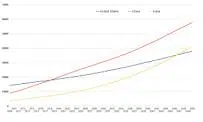In order to know the meaning of the term economic growth, it is necessary, first of all, to discover the etymological origin of the two words that give it shape:
-Growth, first of all, derives from Latin, exactly from the verb "crescere", which can be translated as "to increase in size through what is an organic and natural development."
-Economic, secondly, comes from Greek. It is the result of the sum of three clearly delimited components: the noun "oikos", which means "house"; the name "nomos", which is synonymous with "rule"; and the suffix "-ikos", which is used to express "relative to".
Growth is the act and consequence of growing, a verb that refers to enlarge, increase, increase or expand. Economic , for its part, is that linked to economics (the discipline that studies how to manage scarce existing goods to satisfy the material needs of human beings).
 Economic growth refers to the increase in different indicators of a country's economy . If investments, the production of services and goods, spending and energy consumption increase, for example, it can be said that said nation registers economic growth. This growth usually results in an improvement in the population's quality of life , since people have more money available.
Economic growth refers to the increase in different indicators of a country's economy . If investments, the production of services and goods, spending and energy consumption increase, for example, it can be said that said nation registers economic growth. This growth usually results in an improvement in the population's quality of life , since people have more money available.
There are various factors that are considered to achieve and favor the economic growth of an area. We are referring to some as relevant as these:
-The natural resources that that place has.
-The capital that is available, materialized, above all, in what are industries and machinery.
-The labor force that is possessed. And the more labor there is, the more the productive capacity of that area can increase.
-Of course, another factor that significantly influences the aforementioned economic growth is the set of technology and technological advances that exist in that place. And these will allow, among other things, to increase production using the same resources and improving the effectiveness and efficiency of workers.
-The work experience, training and education that the workforce has.
In a general sense, economic growth implies the increase in the value of services and final goods that are produced in a certain territory during a specific period. This value is known as Gross Domestic Product ( GDP ) or Gross Domestic Product ( GDP ).
The increase in GDP, thus, reflects economic growth. According to various economists, this measure is not enough to determine whether the quality of life of the inhabitants improved, but rather it is necessary to analyze the growth of GDP per capita (per inhabitant).
Other specialists warn that economic growth does not imply that all people have jobs (and, therefore, income) or that public services are efficient, two variables that must be met for a good quality of life. In any case, there is a consensus about the benefits that economic growth brings to a country.
